Student Success Stories
For Aryan, BBCC is about more than taking classes
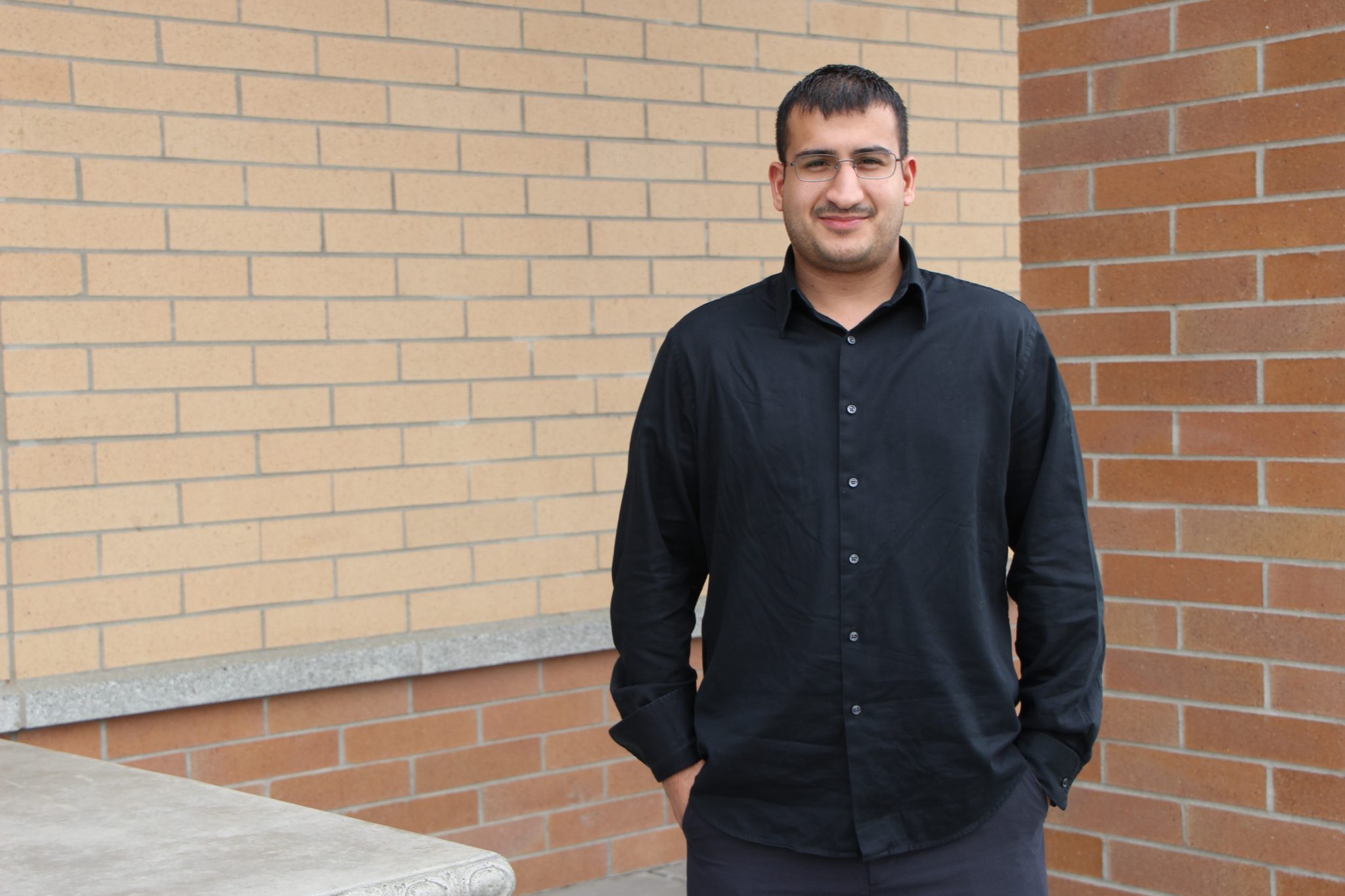
Aryan Dehbozorgi’s father died of an aneurism when he was six years old. By the time he was a sophomore in high school he was breaking the law, going before judges, and being placed in juvenile detention.
As a young adult, he landed in county jail.
“I felt like something was taken from me,” said the Moses Lake native. “My life was a mess and needed to turn around completely,”
Dehbozorgi has transformed his life around at Big Bend Community College during the last two years. He was recognized as a Transforming Lives nominee by the BBCC Board of Trustees on Feb. 25.
While sitting in jail, Dehbozorgi said he realized the death of his father was a wound that had not healed. He knew jail and reckless behavior wouldn’t help him heal and grow.
After he got out of jail, he went to work rebuilding his life. No one would hire him because of his past, so he established a good work ethic and spent six years remodeling apartment complexes, working maintenance, and sustaining a scaffold business.
“I saw the best and worst of people and developed a passion for communicating,” he said. “That sparked an interest for public relations in me as I developed an appreciation for the strategic communications process required for that profession.”
Dehbozorgi’s story is another enhanced by “service learning” opportunities at BBCC. He has served as a Peer Advocate Coach, joined Phi Theta Kappa honors society, worked in the STEM lab, and joined the TRiO and M.E.Ch.A. clubs. He is an active student mentor in the student success center.
“BBCC is about more than taking classes and earning a transfer degree. I have been totally engaged in campus life,” he said.
Dehbozorgi has presented at conferences and led workshops for students, staff and faculty at BBCC. He volunteers to lead prospective students and parents on campus tours.
He is now an accomplished public speaker—drawing a standing ovation from the crowd attending the scholarship fundraiser Cellarbration! for Education on May 16. He is ready to graduate this spring and transfer to a university.
“Big Bend gave me the education and support to transform my life from a downward spiral to a successful pathway,” he said.
As he prepares to move to the next stage of his life, Dehbozorgi reflects on who stood by him during the most difficult times.
“My mother, she never gave up on me,” he said. “I now have a deep appreciation for those who run every mile with you no matter what the path.”
Her education was a good investment for a better life.
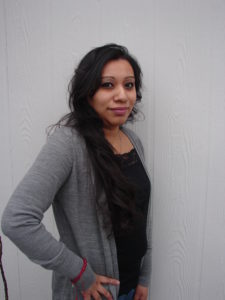
MATTAWA–When Big Bend Community College brought distance learning to Mattawa in 2000, it transformed the life of Maribel Gomez-Aguilar.
Gomez-Aguilar had hopes of returning to school, but she lived 70 miles from campus. Once she gained access to college, she didn’t let up. It took six years to finish an associate’s degree and bachelor’s degree (mostly) online while raising three children and working full time.
The oldest child of migrant farmworkers, Gomez-Aguilar had her first child before graduating from high school. Her first job outside of field work was an entry-level position for BBCC’s Even Start program.
“I could barely answer the telephone I was so shy and afraid,” she said.
College staff encouraged her to seek more education. When interactive television classes arrived in Mattawa, she was the first one to register.
College students taking online classes need the discipline to motivate themselves to complete assignments on time and have good communication with the instructors.
“I was nervous going back to school because I was an average student who didn’t earn good grades,” she said. “I was lucky to have the best tutors to help me. I was able to get face-to-face help in addition to online tutors from Big Bend.”
Gomez-Aguilar was encouraged to apply for scholarships offered by the BBCC Foundation, and she was able to check out books for classes she was taking.
“Big Bend changed my life because after completing my required courses, I was able to transfer to a university. I received help from Big Bend staff that guided me through the process,” she said.
Gomez-Aguilar earned a Bachelor’s Degree in Early Childhood Studies. She has a great job in Mattawa with Inspire, and a secure future. “I have learned that education is an investment for a better life,” she said.
“There were many times I wanted to drop out of college, but I needed to set an example for my kids,” she said. “Now my kids are more eager to attend school and become something in life.”
Aguilar says she was inspired by Terry Kinzel (a mentor and BBCC Title V Coordinator) because “she inspired me to pursue something I thought I would never do.”
Now it is Gomez-Aguilar inspiring others in Mattawa, encouraging people in her community and workplace to transform their lives through higher education.
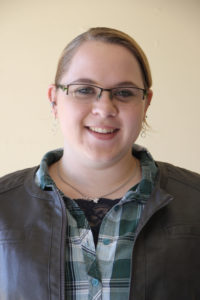
Tabatha DeLong didn’t like school, didn’t do well in school, and seemed to fall into college by accident. Today she is working with cutting edge technology in a career field didn’t know existed a few years ago.
“School was something I legally HAD to do,” said DeLong. “I graduated from high school with no idea of what I wanted to do with the rest of my life.”
After spending the summer of 2011 applying for jobs with no success, she enrolled in business classes at Big Bend Community College.
“I was a year into my degree when learned Big Bend was restarting its computer science program,” she said. “In high school I had always been the person people called to fix their computers. I had never thought much of it.”
By the end of her first quarter in computer science she was hooked. The teachers were engaging. The opportunities were overwhelming.
“Before I knew it, graduation was right around the corner.” She graduated with honors, earning an Associate’s Degree in Systems Administration in 2014.
One of the graduation requirements was to complete an internship. She found one with the BBCC Nursing Department that set her on a career path.
DeLong has helped the nursing program implement simulation technology (specifically 3G Simulation equipment) within the program’s curriculum. The nursing department already possessed some advanced patient simulators, but lacked a person who could maintain, program, and repair them.
A one-quarter internship turned into three quarters. DeLong was asked to continue working for the nursing department after she graduated from BBCC. The college sent her to a Simulation User Networking conference to help her better understand the technology she worked with every day.
DeLong is a full-time student working on her bachelor’s degree at Central Washington University. She remains indispensable in helping BBCC instructors use simulation technology to prepare students for clinical settings.
BBCC plans to start a simulator technician training program. DeLong hopes to earn a bachelor’s degree and be in position to help the college organize and manage the new program.
DeLong was honored in Olympia last January as BBCC’s Transforming Lives Award nominee recognized by community college trustees.
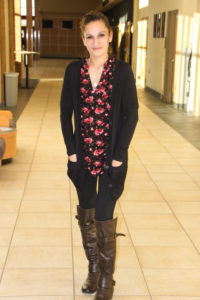
Alicia Wallace had two small children and no job skills when she found the courage to leave a bad situation.
She had been a stay-at-home mom for six years since graduating from high school and didn’t have any financial resources, job skills or work experience.
When she applied for TANF benefits to support her children, the WorkFirst program sent her to Big Bend Community College for computer training.
“I didn’t think college was an option for a single mother with two children,” she said.
She quickly finished computer training offered through WorkFirst and asked about going to college. With the guidance of WorkFirst mentors, she registered for fall classes in 2010.
“I made the President’s List my first quarter,” Wallace said.
To get through school she was referred to other BBCC services like the Opportunity Grant and employment and training programs. She was offered a work study position at WorkFirst.
“There were times I wanted to give up, but I knew this was something I needed to do for myself and for my children,” she said.
Wallace had mentors at WorkFirst and BBCC who helped her transform her life through education. They listened and pushed her to stay in school. They made sure she didn’t miss a class offered only once per year, so she could stay on a timely path to success and degree completion.
“I am proud I graduated with highest honors when I received my Associate in Applied Science Degree in Business Medical Office and Billing, becoming the first in my family to complete a college degree,” Wallace said.
When her mentor at WorkFirst took another position, Wallace applied and was selected as a program assistant for the newly formed Workforce Education Services program at BBCC.
When she leads orientation sessions for new students in the program, she starts by saying, “Four years ago, I was where you are now.”
“Now I have the opportunity to motivate, support, and mentor other students on their pathways to success,” she said.
She is proof to the new students that college is an option.
Darci Alamos
Moses Lake, Washington
AAS-DTA 2003-2009
How would your life be different if Big Bend Community College wasn’t there when you needed it?
“If Big Bend Community College wasn’t there when I needed it I would not have my Associate in Arts and Science-DTA degree, therefore I would not be able to finish my BA in June 2012 as I am doing now. I would probably still be working in a factory or waiting tables and I obviously wouldn’t have my job as an Office Assistant here at Big Bend Community College. With that said, I am extremely thankful for Big Bend Community College because not only has it given me the education I wanted but it has also given me my career”.
How did Big Bend Community College help you progress in your professional/personal goals?
“Big Bend Community College helped me progress in my professional/personal goals by having the program available that I needed in order to obtain my transfer degree so that I could move on to get my BA. I have also been blessed with my job as an Office Assistant at Big Bend for the last 6 1/2 years”.
Who impacted you at Big Bend Community College (faculty or staff)?
“I have been impacted by so many faculty and staff at Big Bend. While I was working on my AAS I had the opportunity to be lectured my many great faculty. Everyone of them are awesome and willing to help in any way possible. As for staff, I have been able to work with just about everyone on campus over the past 6 1/2 years and they have all been a pleasure to know. I have to say the ladies in Registration and now my WorkFirst co-workers have had the most impact on me because I have been with them daily. Not only are they my co-workers but they
have become my extended family”.
Additional Comments:
“Thank you Big Bend Community College, all of the faculty and staff! Without you I would not be who I am today”!
Darci Alamos, Class of 2009
WVC hires Dr. Chio Flores as new vice president of student services
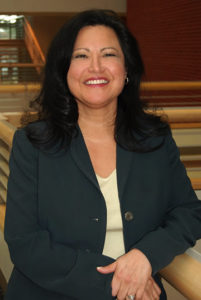
Big Bend Community College alumnus Dr. Chio Flores is coming home. Flores has been hired as the vice president of student services and enrollment management at Wenatchee Valley College.
“Wenatchee has always beckoned a bit,” she said of her move back to North Central Washington. “This is a great opportunity, and I’m glad I seized it.”
Flores earned her GED at Big Bend Community College, in addition to earning her associate degree and starting her career there. “For six years, I flourished as a young professional and as a student,” she said. She was hired in the admissions office and later began conducting GED examinations.
Flores grew up in Quincy, the oldest of six children. Neither of Flores’s parents completed high school, and both were migrant workers until they settled in Quincy to raise their family. “My parents instilled the value of hard work not only with our academics but also our jobs and our personal development. My personal story is a narrative to that,” she said.
“I often wonder whether my educational trajectory would have been different if I hadn’t begun working at BBCC,” Flores said. “I was one of a few staff of color on campus. Professionally, I was really fortunate at Big Bend Community College. It was a cohort of individuals who were really helping me along, teaching me the ropes .”
Flores knew she wanted to earn a bachelor’s degree, so she transferred to Eastern Washington University where, she said, she struggled to adjust. She began to attend events and participate in student groups; in doing so, she acclimated to university life. “Once I made a point to engage as fully as I could, it became easier.”
She earned both her bachelor’s and master’s degrees in business through EWU, developed a career in financial aid, and continued on to Washington State University to earn her PhD in higher education.
“I did promise my parents that this was the last graduation that they would have to attend,” she said. WSU celebrates the achievements of its graduates with multiple ceremonies, not just one. Her educational journey, which had taken 10 years, culminated in three ceremonies in one day—multicultural, Chicano/Latino and the main graduation.
At WSU, her professional responsibilities had also increased—she served as assistant director of transfer relations as financial aid director, and, finally, as assistant dean of students and the director of the Cougar Money Management Program.
“During my time at WSU, I have seen remarkable progress in terms of student diversity and to some extent, faculty and staff,” she said. “I’ve contributed, I feel, to some of this change whether in my professional roles, as a student group adviser, a recruitment/retention/diversity council member, or my work on boards that seek to improve access and equity.”
Flores has volunteered on several educationally focused boards: as a trustee for College Board, and as a trustee and chair for College Spark Washington, a foundation that supports college readiness and completion of low-income students. She also serves on the Community Partner for the Northwest Association Educational Opportunity Programs Board, an organization of educators who work with low-income, first-generation and disabled students.
At WVC, Flores will be responsible for a wide variety of areas, including admissions and registration, financial aid, special programs and services, the new TRiO student support services program, recruitment, veterans and international student services, educational and career planning, counseling, athletics, the College Assistant Migrant Program (CAMP), student housing and student programs. She will also oversee enrollment management.
She is looking forward to fostering student success and having more contact with students. “Every student, every person, is capable,” she said. “How they are given the opportunity to thrive is what determines the level they will succeed.”
WVC President Dr. Jim Richardson, who has been hoping to fill the role of vice president of student services for the past four years, is looking forward to Flores’s arrival. “She will bring her unique background of being a first-generation community college student to her role as the leader of WVC’s students,” he said.
“What I’m hoping to do at WVC is bring us to a point where we are one of the recognized best practices institutions,” Flores said. “Community colleges have been doing the work of serving first-year, low-income students a lot longer than four-year or private institutions. We know the best practices.”
He hoped to one day be the manager at a fast-food restaurant, but Timothy Woodiwiss ended up using his community-college degree as a springboard to something much more ambitious: medical school.
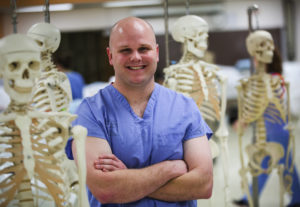
When Timothy Woodiwiss dropped out of high school in ninth grade, his biggest ambition was to manage the Ritzville McDonald’s.
At 18, he joined the Washington Army National Guard and, after working in New Orleans after Hurricane Katrina, decided he wanted to do something bigger with his life than serving Big Macs and French fries.
So he enrolled in community college, where he started in remedial math — basic algebra.
Over the next nine years, he cycled through a half-dozen majors and career ideas, from firefighter to accountant to veterinarian.
His studies were interrupted by two military deployments, but he always returned to college. He also got married, started a family and worked full time, but stayed in college.
Woodiwiss could have let his career be sidelined by any one of these events, but he never gave up.
“I failed so many times in my life,” said Woodiwiss, who has a shaved head and a gentle, boyish face. “At one point I got fired from McDonald’s.” He got a D in organic chemistry the first time he took the class — a failing grade. Over and over, he said, “I felt like a miserable failure.”
Yet today at 29, he is a first-year medical student at the University of Washington, after graduating with honors last year from Washington State University with a bachelor’s of science in biochemistry, and minors in microbiology and animal science.
And last month, Woodiwiss was one of 34 students honored by the State Board for Community and Technical Colleges for using a two-year college education as a springboard to a new life.
All those students embody tenacity and grit. Many were high-school dropouts. Some overcame poverty, drug addiction and homelessness, fled abusive parents, joined gangs, attempted suicide, went to prison for breaking the law.
Some were raised by alcoholics and junkies. A few managed to keep going to school despite physical disabilities. Many attended college while working and raising children on their own.
“You just read these and you cry, you cry, literally,” said Joanne Schwartz, a trustee for Centralia College, who has been helping select the award winners for the last five years. “Because you can’t help it. You’re so overcome with people’s desires to do better, to get beyond all the obstacles.”
More in Education
Early takers say new SAT ‘wasn’t so bad’ and not so tricky
Lawyer: Motives of Ukrainian student impostor were ‘pure’
University of Phoenix’s parent company laying off 76 Seattle workers
UW police: Man allegedly sexually assaulted student in residence hall
Bill on sexually explicit books gets final OK in Virginia
What might it cost to keep expelled students out of prison pipeline? $1.8 million a year
Personal character and resilience play a key role, as they have in Woodiwiss’ case. But the students who succeed almost always found a helping hand as well, Schwartz said.
That person might be a teacher, a counselor, sometimes even a fellow student. “They discovered someone who really cares about them,” Schwartz said.
Starting small
Big Bend Community College in Moses Lake was Woodiwiss’ springboard to college. But when he first enrolled, he feared that if he asked a stupid question, he’d be discovered for what he was — a high-school dropout.
“I was really terrified,” he said. “I was scared I wasn’t smart enough. I felt like I was missing this foundational knowledge … and someone like me shouldn’t be there.”
He’d grown up in the small Eastern Washington town of Lind, the sixth of 12 children. His father was a postal worker, his mot her a stay-at-home mom, and neither had attended college. In high school, Woodiwiss didn’t see much point in going to college, either.
He dropped out at 16 and put in long hours at McDonald’s, working his way from a member of the crew to shift manager. Woodiwiss took the GED test at Big Bend so he could work full time during school hours. Because he couldn’t afford the gas to drive to Moses Lake — 41 miles away — for prep classes, he took the test anyway, and passed.
Shortly after his 18th birthday, Woodiwiss joined the Washington Army National Guard and soon was sent to New Orleans after Hurricane Katrina, where he witnessed the anguish of people who had lost everything in the storm. When he returned to Washington, his aspirations had changed beyond McDonald’s, and he moved to Moses Lake and enrolled at Big Bend.
There he met Barbara Whitney, a math instructor who treated every question with patience, without ever making a student feel inferior for not grasping a math concept. “She was so kind,” he recalled.
Whitney still teaches at Big Bend, and she still treats every student equally, regardless of how much — or how little — they understand algebra.
“That’s important,” said Whitney, a 27-year veteran of the community-college system. “They pay good money, and they’re here to learn. There’s a saying: The only question that’s stupid is the one you don’t ask.”
Whitney remembers Woodiwiss as a quiet, reserved student who sat in the front of the classroom. “He didn’t have a lot of family support, but he had a lot of drive,” she said.
Woodiwiss was influenced by other teachers, too — an English composition teacher who encouraged his writing, and a history teacher who gave him his first A, on a paper about the history of the Balkans.
“I thought my ideas were so small, but my history teacher loved it,” Woodiwiss said.
Looking back, Woodiwiss thinks his insatiable appetite for reading as a teenager helped get him through the first quarters of college. He learned discipline in the military, and his faith played an important role in what he’s achieved. But community college was pivotal.
“Without community college, I never would have had a chance to go to university,” he said. “It was the perfect setup for someone like me.”
Ready for a challenge
When Woodiwiss transferred from Big Bend to WSU in 2008, he had a 3.5 GPA. He no longer waited until the last minute to complete assignments or study for a test. He’d learned how to be a better student.
But the sprawling Pullman campus, so much larger and more intimidating than Big Bend, was a tough transition. “I really struggled,” he said.
He failed his first biology test but did better on the second. On the last exam of the semester, he earned an A.
Woodiwiss was called up for active duty in 2009 and left Pullman for a year to drive supply trucks to and from U.S. military bases in Iraq, where every mission was haunted by the fear an improvised explosive device would detonate under the truck.
But deployment also gave him a chance to think about how lucky he was — how much more opportunity he had, as an American, than Iraqis stuck in a perpetual war zone.
His education was put on hold a second time when he volunteered for active duty and was assigned to serve in Bahrain, a month after he married his wife, Jessica. When he returned to Pullman, “I really wanted to challenge myself, to finally overcome my fears,” Woodiwiss said.
He had planned to become a veterinarian but began thinking about becoming a doctor after watching the movie “Gifted Hands,” about the surgeon (and current presidential candidate) Ben Carson. Later, he read the Pulitzer-winning nonfiction book about the history of cancer, “The Emperor of All Maladies,” by Siddhartha Mukherjee.
“After reading that book, I was hooked,” he said. “I was enthralled with the ability of a physician to touch the life of another human being and help them through the most difficult time of their life.”
After graduating magna cum laude from WSU, and being inducted into the Phi Beta Kappa honor society, he spent thousands on a preparatory class for the Medical College Admission Test, or MCAT, while he and his wife cared for daughter Isabella, now 2.
He was accepted to three medical schools, including the UW, which became his top pick.
To succeed in school requires a thousand steps, Woodiwiss said. “You take one step at a time. You never realize how it all added up.”
Whitney, the Big Bend math teacher, said Woodiwiss gave a speech at the college recently and talked about how he sat in his car in the parking lot on the first day, summoning the courage to walk into a class, fearing he’d be labeled the stupidest student on campus.
“He was ready for failure the first day,” she said. “But with a little bit of encouragement …
“Oh, man, he’s going to go so far.”
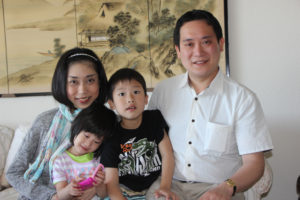
A Japanese graduate of Big Bend Community College’s Aviation Maintenance Program has returned to the Pacific Northwest with his family to take on a new job with NIPPI Corp.
Jun Saito’s business card reads “FAA Certified A&P Mechanic.” He earned the FAA certificates at BBCC in 2003, and the credentials have transformed his life. FAA certificates are an international standard, and have taken Saito a long way in the aerospace industry.
Saito was recently promoted to General Manager of the International Contract Administration, Aerospace Division, for NIPPI Corp. He received letters of recommendation from Boeing officials in support of his work visa. He will have offices in Everett and Kirkland.
Lori Benavidez McIntyre
Moses Lake, WA
AAS Accounting 1988
How would your life be different if Big Bend Community College wasn’t there when you needed it?
“I would still be a cashier working in one of the local mini-marts if it were not for the educational opportunities available at Big Bend Community College”.
How did Big Bend Community College help you progress in your professional/personal goals?
“My first degree was an AAS in Accounting. That degree led to 10 years of employment as a bookkeeper for a local parts supply company. Several years later I was able to return to Big Bend Community College to take the courses I needed in order to transfer to Heritage University. Attending Heritage University was only possible for me because of the branch campus they have on the Big Bend Community College campus”.
Who impacted you at Big Bend Community College (faculty or staff)?
“One of the people who had a large impact on my education at Big Bend Community College was Mr. Rex Wilkes. When I started the courses needed to earn my AAS in Accounting I was the first member of my family to attend college and was very uncertain and nervous. Mr. Wilkes was a valued and greatly respected mentor who offered guidance, support, and assistance to me a nd my classmates.
Additional Comments:
“Big Bend Community College allowed me to get the education needed to improve the quality of my life–first as a bookkeeper and then ultimately in the profession I had dreamed of from childhood–teaching. Happy 50th Anniversary Big Bend Community College!
Lori Benavidez McIntyre, Class of 1988
Donald A. Benson
Palmer, AK
Commercial Pilot 1970-1972
How would your life be different if Big Bend Community College wasn’t there when you needed it?
“I was a Commercial Bush Pilot in Alaska for 20 years—I’m sure that would have changed Dec 1, 2011 8:36 PMI was a Commercial Bush Pilot in Alaska for 20 years—I’m sure that would have changed”.
How did Big Bend Community College help you progress in your professional/personal goals?
“After earning my pilots certificates–I paid for my Airframe & Power Plant certificates by flying in the summer time”.
Who impacted you at Big Bend Community College (faculty or staff)?
“Flight Instructors”.
Donald A. Benson, Class of 1972
Jack Gibson
Moses Lake, WA
AA Computer Science 1988-1991
How would your life be different if Big Bend Community College wasn’t there when you needed it?
“I would not have had the successful career in Information Technology that I have enjoyed for the last 20 years”.
How did Big Bend Community College help you progress in your professional/personal goals?
“BBCC gave me the tools and the foundation I needed to excel in the field I chose. Without the education, opportunities and support I received from BBCC I would not be where I am now”.
Who impacted you at Big Bend Community College (faculty or staff)?
“There were so many. But I have to give the most credit to Van Jorgensen, head of the computer Science department, who gave me a terrific foundation and the critical thinking skills that have served me so well in my field. Also Janet Hubbard, former BBCC director of Technology, and Denise Yochum, a former Dean, gave me opportunities that directly affected my growth, continued education and experience and I am grateful to them for the faith they placed in me”.
Additional Comments:
“Due directly to my Beg Bend education, I have worked in Information Technology management for two international companies, made a comfortable living and have traveled around the country and even to China where my current company has a site with a computer network that I am responsible for. It all began with BBCC”.
Jack Gibson, Class of 1991
Greg Johnson
Dickinson, TX
Associates in Applied Science 1972-1974
How would your life be different if Big Bend Community College wasn’t there when you needed it?
“I would never have gotten to become a NASA astronaut and launch into space without the fundamental flight training I received at BBCC”.
How did Big Bend Community College help you progress in your professional/personal goals?
“I received my Commercial/Instrument/Instrument Instructor and seaplane ratings while I was at BBCC. I also received 2 years of engineering training which I used to transfer to the University of Washington where I completed a BS in Aeronautics and Astronautics”.
Who impacted you at Big Bend Community College (faculty or staff)?
“Del Lamb and Buck Wheat were 2 instructors who helped me get my first aviation ratings. I invited Buck Wheat to my Space Shuttle launch in May 2009”.
Additional Comments:
“My experience at BBCC was memorable and I will forever be indebted to all my academic and aviation instructors. Greg C Johnson (Ray J) NASA Astronaut”.
Greg Johnson, Class of 1974
Terry Kinzel
Ephrata, Washington
Associate in Arts and Science 1995
How would your life be different if Big Bend Community College wasn’t there when you needed it?
“I would probably still be working 3 or 4 part time jobs for barely minimum wage”.
How did Big Bend Community College help you progress in your professional/personal goals?
“I attended Big Bend during my lunch hour for 3 years to get enough classes (one class a quarter) to get my transferable degree. I needed the AA degree to be eligible for a promotion at Head Start. I got the promotion. That promotion gave me the courage to apply for and get my first position at Big Bend, Families that Work Coordinator-temporary. I was put on full time after 6 months after growing the program from $70,000 to $250,000 and 150 students. I also had to commit to obtaining my BA within two years. I completed the BA degree within two years entirely online through Western Washington University. If President Bonaudi had not insisted, I would not be doing what I am doing now. I am forever grateful for that push”.
Who impacted you at Big Bend Community College (faculty or staff)?
“The single most important person at Big Bend when I was a student was Dave Wolfe. I took several classes from him and he was a great instructor. But the most important thing he did was let me challenge English 201. I needed that class to graduate and I was in a hurry because my husband had cancer and was in chemotherapy treatments. His prognosis was very grim and I was afraid I may have to be the sole provider for my family. I felt I was running out of time and I needed the degree to give me a shot at better paying jobs. Mr. Wolfe allowed me to challenge the class and graduate at the end of Spring Quarter instead of the barrier of returning in the fall for that one class. It made all the difference in the professional choices I had from that time on. It allowed me to apply for the job at Big Bend in 1999”.
Terry Kinzel, Class of 1995
Margie Lane
Moses Lake, WA
Associate in Arts & Science 1987-1991
How would your life be different if Big Bend Community College wasn’t there when you needed it?
“Would probably not have completed any degree to improve my opportunities for employment”.
How did Big Bend Community College help you progress in your professional/personal goals?
“Provided classed needed to graduate with degree and attend WSU extension program with junior status. Earned bachelor’s degree at WSU”.
Who impacted you at Big Bend Community College (faculty or staff)?
“Stephen Lane, math instructor. Harrell Guard, VP Candy Lacher, Registrar….and super-hero”.
Additional Comments:
“Facult and staff at BBCC are not only knowledgeable, but very pleasant to work with as a student…..I am not biased”.
Margie Lane, Class of 1991
Nichole McCauley
Spokane, WA
AA 1996
How would your life be different if Big Bend Community College wasn’t there when you needed it?
“I would be more in debt with student loans. Living in my hometown with my parents while I obtained my AA helped to save money. It also helped me experience college life and a bit of freedom while being in familiar surroundings”.
How did Big Bend Community College help you progress in your professional/personal goals?
“It allowed me to transition from high school to college life gradually. Big Bend helped lay the groundwork for my major in Elementary Mathematics. I took many math courses at Big Bend which helped me increase my love for math. Experienced professors and small class sizes allowed me to get more one-on-one attention regarding class participation and grading/feedback”.
Who impacted you at Big Bend Community College (faculty or staff)?
“I had several Professors who impacted my educational experience and helped me reach educational goals. Specifically, Dr. Andrus who answered my litany of questions always with patience and John Carpenter who never failed to give specific feedback on my papers helping me to improve my written skills. Both encouraged my love for learning and continued growth”.
Additional Comments:
“I had several Professors who impacted my educational experience and helped me reach educational goals. Specifically, Dr. Andrus who answered my litany of questions always with patience and John Carpenter who never failed to give specific feedback on my papers helping me to improve my written skills. Both encouraged my love for learning and continued growth”.
Nichole McCauley, Class of 1996

